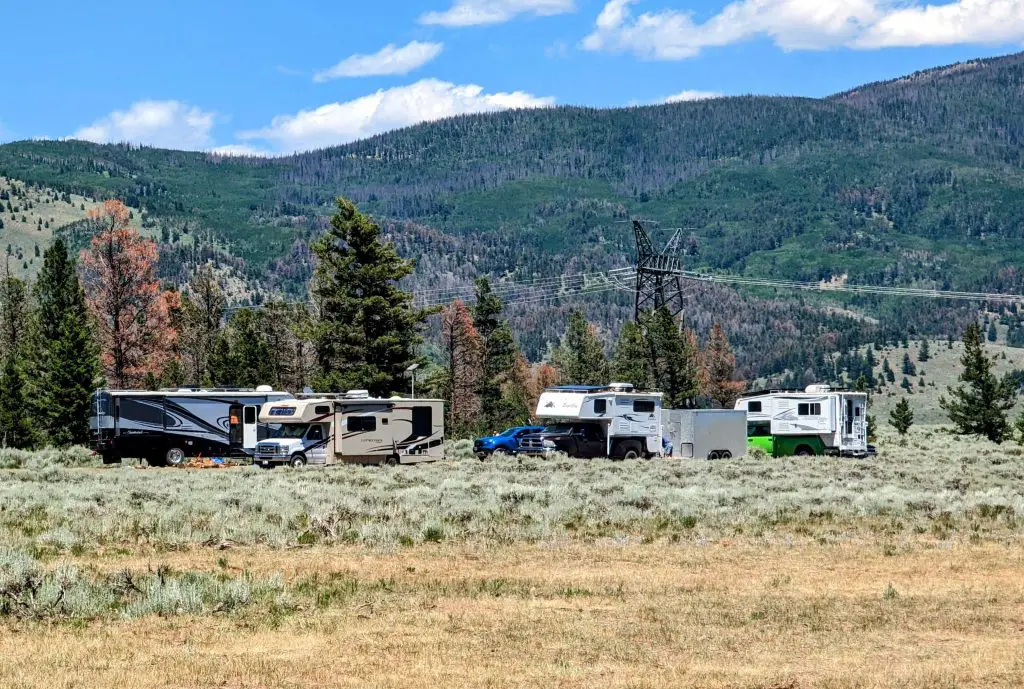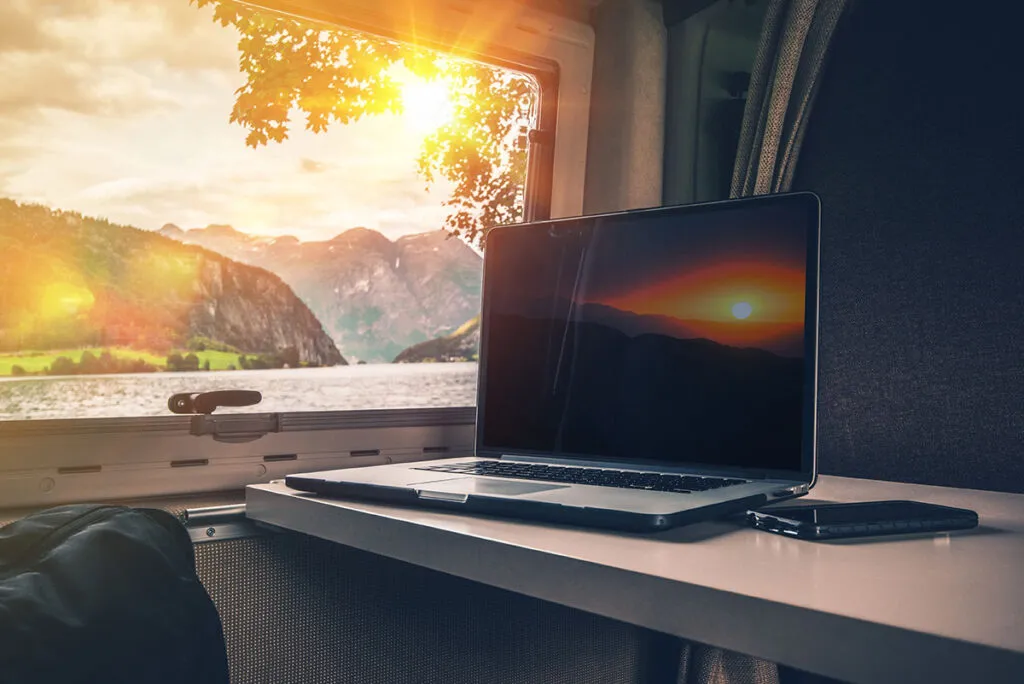Last Updated on February 12, 2024
Key Takeaways:
- Financial Preparation: You don’t need to be retired or wealthy to live a full-time RV lifestyle. However, financial planning and finding ways to support yourself are crucial. Understanding the costs associated with RV living, which can range from $1000 to $3000 per month, is essential for budgeting effectively.
- Income Generation: With the rise of remote work opportunities, transitioning to a full-time RV lifestyle has become more accessible. Many employers now offer permanent stay-at-home jobs, allowing individuals to work from anywhere with a good internet connection and a laptop. Platforms like Upwork, Freelancer.com, and others provide opportunities for remote work.
- Steps to Support RV Living: Make a Budget: Establish a budget for daily expenses, prioritizing essential needs and avoiding extravagant spending. Track Expenses: Keep track of income and expenses to maintain financial awareness and identify areas for cost-cutting. Research: Gather information on the costs of living in different places, prepare for unexpected expenses, and prioritize spending based on importance. Get Out of Debt: Prioritize clearing debts to achieve financial freedom and avoid limitations on spending while living on the road. Find a Source of Income: Explore remote work opportunities through online platforms, showcase your skills on LinkedIn, and utilize resources like FlexJobs, Indeed, and remote work-focused websites to find suitable employment.
- Resource Recommendations: Various websites offer resources and job listings for remote work, work camping, and RV-friendly employment opportunities, making it easier for individuals to support their full-time RV lifestyle.
- Living the Dream: By following these steps and securing a source of income that allows for remote work, individuals can fulfill their dream of living a full-time RV lifestyle while enjoying the freedom and adventure it offers.
Are you thinking of starting a full-time RV lifestyle but don’t know where to start? It can be overwhelming at first, but with the right planning and preparation, you can make it happen. Many people who dream of having a full RV lifestyle often think that you have to be retired and have loads of money to be able to move from one place to another at ease. However, the real truth is that being rich and retired is not a requirement to live your full-time RV life. The main thing for you to fulfill your dream is to find ways to support yourself.
One of the biggest challenges of transitioning to a full-time RV lifestyle is figuring out how to make money while on the road. Before you start living in your RV, you need to have a plan. Find out the reason for this change then you can address various concepts of your new life. Living life on the road will simplify your life in many ways, but you will still have bills to pay.
Before you start asking where you will get money from, you need to know the cost of being a full-time RVer. There is no specific cost for living in your RV full-time. However, the cost can be roughly around $1000-$3000 a month, but your expenses can make the figures go higher or lower. One major cost is if you will live in private parks or camps. Or you can boondock for free on public land. You can know your total costs when you make a budget. This is especially the case if you have a family, pets, or both.
As the COVID pandemic slows down, more and more employers offer permanent stay-at-home jobs, which you can do from anywhere. It’s the perfect time for you to take the leap and get the freedom you desire. With a good internet connection, a laptop to work on, you can find work anywhere. You can find jobs that you can do remotely on your laptop, that are often more flexible and with pay rates better than before. You will save so much time by not commuting each day that you can spend with more adventure.
Here are steps you can take to support your full-time RV lifestyle.
1. Make a budget
You cannot start any project without having a budget in mind. You should sit and create a budget for your daily life in the RV. When making your budget, you should avoid any extravagant expenses. Think of the bare minimum activities you need on a daily basis; some of them are eating, drinking, entertainment, shopping and others.
When working on your budget, give yourself some room to spend more money on random stuff. You also have to factor in things you need but are not urgent. When creating your budget, don’t forget the annual expenses such as your car insurance renewal, RV license, and others.
No products found.
2. Track your expenses
You need to be financially aware and know how much income you are getting and what you are spending it on. You can do track them by saving the receipts that will give you an accurate record of your expenses. It will make it easy for you to make the necessary cuts and remove things you do not need.
For instance, subscription services are not mandatory since you’ll be moving most of the time. Although I don’t know where I would be without my Netlfix subscription! I meant that you won’t need location-dependent subscription services anymore like cable TV or magazines. Only subscribe to the services you need.
Tracking your expenses will make it easy for you to make a budget suitable for living on the road. It would be better to live within your means and avoid getting yourself into debt. Do not forget to include all of your expenses, even the small ones, because it will give you a complete picture of where your money goes every month.
You can keep track of your expenses in a budget journal, an online expense and income tracker, or even an app. Either of these options is great as long as you make it a habit of recording everything.
The next step is planning your monthly spending pattern. Calculate how much money you have and decide on a budget that is suitable for your situation. You can set aside an emergency fund since life on the road is unpredictable. You should save up to have at least a $1000 emergency fund at a minimum.
Prioritize your expenses from the most important to the least important. From there, you can take away all the things, or adjust your budget to live within your means. Taking your time to sit and create a budget can seem like an unimportant thing to do, but it will save you money and the headache in the long run.
3. Do your research to avoid surprises
You do not start any project without enough information. Do your research and find out the cost of living in different places. You can look for information from others who are living in their RV full-time. Getting information will make it easier for you to prepare and deal with any unexpected things that happen while you are on your road.
Roughly, here are the common expenses on the road:
Food: Prepare your own food and eat at the cheapest places you can find to save money. It would be better if you could cook outside most of the time and save on cooking expenses. You should stay away from the restaurants as much as possible to live cheaper. Cooking at home will cut down costs dramatically. Also, sharing meals is good for your budget of living on the road.
Entertainment: You may won’t be in the same place long, but you will still want to discover your surroundings. Parks, museums, and other attractions can cost lots of money. Spend on what you can afford. Having a budget will make it easier for you to stick to a certain limit. If you don’t watch what you spend, it can easily wipe out your savings in no time. It’s better to have things you can do outside of spending money—for instance, hiking, fishing, and others.
Fuel: Usually, it is one of the largest part of your monthly expenses (unless you don’t travel often). Gas prices have gone up recently and it cost way more to fill up your tank. RVs can be gas guzzlers and you can easily spend over $100 a day on gas if you drive often.
Health: Health is important. Your monthly budget should include medical expenses in case you get sick or injured when you are on the road. Good health insurance can help as well, but those won’t come cheap. Prevention is one of the best policies. You can start by eating healthy, cooking your own food, drinking lots of water, avoiding stress, exercise regularly.
Utilities: You can reduce your utility expenses by using the power of the sun. Even if you are in a park, many require you to pay more if you want to connect to electricity. If you have your own solar power, you can just stay in parks and dry camp. You can still stay in awesome parks but much cheaper.
Campground fees: Campground fees will be part of your monthly expenses unless you are boondocking exclusively. I personally do both. I don’t mind paying for nicer campgrounds when I travel alone, but when with friends, we usually go boondocking.
Additional RV Expenses: As for your RV expenses, it will depend on the type of RV you have. But usually, you have to budget for maintenance, repairs, parts replacement, storage units, and other smaller, sometimes bigger things here and there.
As mentioned earlier, you can ask some people who are living this lifestyle. Ask me in the Comment section. I would be glad to answer to all your questions.
4. Get out of debt
Most debts are not good to have and you should avoid them at all costs. By not having bad debt, you will have less worry. If you are not in control of your money, then you will probably end up in debt. I got rid of all my debt before moving into my RV. I feel freer and less worried.
When you have a debt, you will have limitations until the debt is cleared. One major debt you can incur is getting your RV on loan. It is better to buy something you can afford and pay cash for it than take a loan if you can afford it. Even if that’s not the RV of your dreams. Getting out of debt is your first step towards financial freedom.
I remember test driving a Promaster Class B RV about a year prior to my RV lifestyle. I loved driving it, I loved how it felt and I was about to buy it but I wasn’t approved for the loan. I had a great credit score but an RV is a luxury item in the eyes of loans, and it was harder to get approved. I was crushed. Then I found my first RV on Craigslist. It was used, and not new and shiny but I bought it about 10k cheaper than it was worth. Luckily I did not get into a huge debt. I would be still paying my Promaster if I was approved that day. Not even talking about the fact that I got rid of my first RV first year in my RV life because it was too small for me. If I was still paying my Promaster, I would still have it and wouldn’t be happy. Unfortunately, I know of some people who were approved “that day” and they have an RV they are not happy with, still paying it and it costs almost like a mortgage.
5. Find a source of income
Now that you know what you need and the cost, you need to determine how you will finance your living expenses. Getting a job that allows you to work remotely is the biggest challenge when it comes to living full-time in your RV.
If you have a job, see if your employer will allow you to work remotely before you hand in your resignation letter. If not now, when? While not all companies are open to doing this, some actually offer this opportunity to employees.
Otherwise, you will have to completely convince your employer that you are more efficient working at home than in an office. You can also show your employer that you can still communicate through Skype and other platforms. It is now up to you to convince your boss that you can do your work just fine even without having to report to the office.
Alternatively, if this isn’t an option, your next choice would be to look for online jobs that allow you to work anywhere else. There are plenty of jobs that offer remote work, and you can take your pick. As long as you have an internet connection, you are good to go.
There are different online platforms that are hiring. Some of these sites include Upwork, Freelancer.com, Guru, and others. You can customize your profile on LinkedIn where you highlight your specialty features and show that you work remotely.
Some great websites for more remote work search:
- https://www.workingnomads.co/
- https://powertofly.com/jobs/
- https://remoteok.io
- https://upwork.com
- http://freelancer.com
- https://www.flexjobs.com
- http://www.indeed.com
- http://www.skipthedrive.com
- https://www.outsourcely.com/remote-sales-marketing-jobs
- https://www.guru.com/
Here are some more great resources to help you find a remote opportunity:
- https://www.forbes.com/sites/kaviguppta/2016/05/02/five-powerful-resources-for-finding-remote-work-opportunities/#45114a4f145f
- https://www.outsourcely.com/remote-sales-marketing-jobs
- https://www.flexjobs.com/blog/post/companies-switching-remote-work-long-term/
- https://skillcrush.com/2014/10/10/sites-finding-remote-work/
Here are some great websites for work camping and remote jobs:
- Work Campers get free RV sites, sometimes pay, and other perks. If you’re a mobile adventurer, try CoolWorks.
- Sometimes a remote customer service job is just what you are looking for.
- America’s Natural and Cultural Resources Volunteer Portal offers opportunities in state parks for free camping, hookups, and sometimes pay.
- KOA also has its own website for work campers.
- There are work camping jobs at campohost.org.
- Then there are Workers on Wheels, where you can find seasonal employment, short-term jobs, and other campground positions.
- Part-time work camping couples can have a great time: work a few hours a week in exchange for no rent and other perks like free laundry, wifi, propane, etc. Sometimes you even get a small salary too. Check out workingcouples.com
Doing these things will make it easy for you to support your full-time RV lifestyle. You will finally have the chance to live your dream to the fullest.
Last update on 2024-04-18 / Affiliate links / Images from Amazon Product Advertising API









